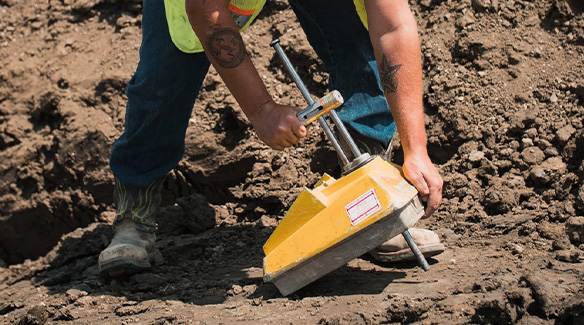Specialist Consulting Engineer Providers for Cutting-edge Infrastructure Solutions
Specialist Consulting Engineer Providers for Cutting-edge Infrastructure Solutions
Blog Article
The Interdisciplinary Approaches in the Geotechnical Sector: Connecting the Space Between Design, Geology, and Environmental Science for Ideal Task Outcomes
The integration of engineering, geology, and ecological science within the geotechnical market is not simply advantageous; it is essential for attaining ideal task end results. What methods might arise to facilitate this vital partnership and improve the efficiency of geotechnical practices?
Importance of Interdisciplinary Partnership
The importance of interdisciplinary collaboration in the geotechnical sector can not be overstated. Effective geotechnical projects call for the combination of diverse know-how from numerous fields, consisting of engineering, geology, and environmental scientific research. This collaboration makes sure that all aspects of a task are thought about, leading to comprehensive services that deal with intricate obstacles.
Interdisciplinary partnership fosters advancement by allowing specialists to share insights and approaches that might not appear when functioning in isolation (geotechnical engineers). By leveraging the staminas of several disciplines, teams can identify possible risks, optimize design procedures, and improve the sustainability of geotechnical tasks. Furthermore, such partnership advertises a holistic understanding of site-specific problems, which is vital for exact analysis and decision-making.
The intricacy of geotechnical tasks requires a coordinated technique to analytical. Inevitably, interdisciplinary partnership is necessary for progressing finest techniques and achieving excellence in the geotechnical sector.
Secret Duties of Each Technique
Partnership among different disciplines is not just useful; it is important for the successful implementation of geotechnical projects. Each self-control-- engineering, geology, and ecological scientific research-- plays an unique yet interconnected function that adds to project efficiency and sustainability.
Geotechnical engineers are largely accountable for developing foundations and guaranteeing architectural integrity. They evaluate soil and rock residential properties to examine load-bearing abilities, offering necessary information for safe building techniques. Their expertise makes it possible for the formulation of ingenious solutions to intricate challenges.

Environmental scientists examine the potential impacts of construction on ecological communities and water sources. They perform environmental assessments and develop mitigation approaches to reduce negative results. By incorporating eco-friendly considerations, they ensure conformity with policies and promote sustainability throughout the job lifecycle.
Study of Successful Combination
Effective integration of geotechnical self-controls can be exhibited through various study that highlight the effectiveness of team effort in attending to complex engineering difficulties. One notable example is the building of the Hong Kong-- Zhuhai-- Macau Bridge, where a collaborative method including geotechnical engineering, geology, and ecological science was vital. Engineers and geologists operated in unison to evaluate the seabed conditions and maximize the foundation layout, guaranteeing stability and minimizing ecological impact.
An additional impactful case is the improvement of slope stability in the San Francisco Bay Area, where an interdisciplinary group combined geotechnical analysis with environmental evaluations. By integrating hydrological researches and geological studies, the team effectively determined possible landslide risks and carried out reliable mitigation actions, improving safety and security and sustainability.
Moreover, the redevelopment of Brownfield sites often requires a multidisciplinary approach. In one instance in Chicago, cooperation amongst geotechnical designers, environmental researchers, and city organizers caused the successful remediation of infected soil, permitting the safe improvement of the website right into an area park. These case research studies show that interdisciplinary cooperation not only addresses technical difficulties yet additionally fosters ingenious services that profit both jobs and communities.
Obstacles in Multidisciplinary Projects

In addition, coordinating timetables and workflows amongst various groups can be problematic, specifically when each discipline has distinct task turning points and deliverables. This imbalance can result in delays and increased prices. The difficulty of resource allotment additionally impends big; making sure that specific expertise is readily available at vital points needs careful preparation and foresight.
Last but not least, governing conformity positions another significant challenge. Each technique may deal with different regulative structures, and lining up these demands to meet job objectives can be lengthy and intricate. Resolving these challenges demands solid leadership and efficient communication strategies to promote partnership and make sure that multidisciplinary groups function cohesively in the direction of shared objectives.
Future Trends in Geotechnical Practices
As the geotechnical market develops, arising patterns are reshaping practices you can try here to deal with the challenges faced in multidisciplinary projects - consulting engineer. One substantial pattern is the increased assimilation of sophisticated technologies, such as synthetic intelligence and machine discovering, right into Discover More Here geotechnical evaluation and design. These innovations boost predictive modeling and danger assessment, allowing designers to make even more informed decisions throughout the job lifecycle

Additionally, the adoption of digital twins and real-time monitoring systems is ending up being more common. These tools promote recurring assessment of dirt conditions and structural efficiency, enabling prompt treatments when issues emerge.
Verdict
To conclude, the integration of engineering, geology, and ecological science is essential for attaining optimum outcomes in the geotechnical sector. Interdisciplinary cooperation cultivates technology, improves problem-solving capacities, and aligns technological demands with ecological sustainability. Effective case research studies show the advantages of this method, while recognizing the obstacles encountered in multidisciplinary jobs. you could check here Looking in advance, welcoming these collaborative methods will certainly be crucial for navigating future trends and progressing the area of geotechnical engineering.
The assimilation of design, geology, and ecological science within the geotechnical industry is not merely beneficial; it is vital for attaining optimal task results. Effective geotechnical tasks require the integration of diverse proficiency from various fields, including design, geology, and ecological scientific research.Browsing the intricacies of multidisciplinary projects in the geotechnical industry offers a number of considerable challenges.As the geotechnical market progresses, arising trends are improving techniques to deal with the obstacles encountered in multidisciplinary tasks. Geotechnical engineers are progressively collaborating with ecological scientists to ensure that jobs align with sustainability goals and conform with regulative requirements.
Report this page